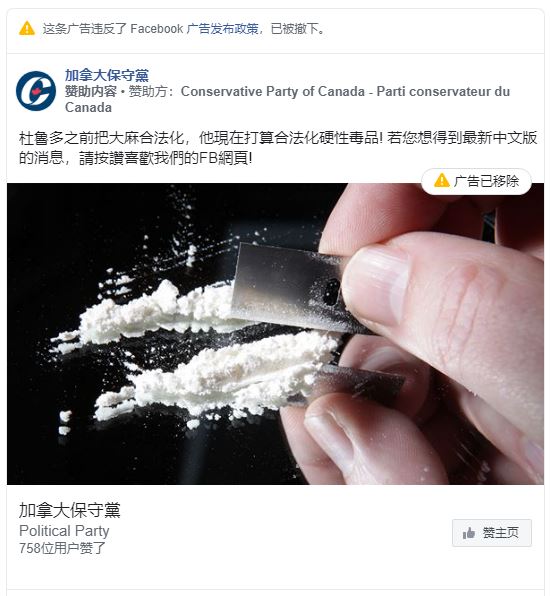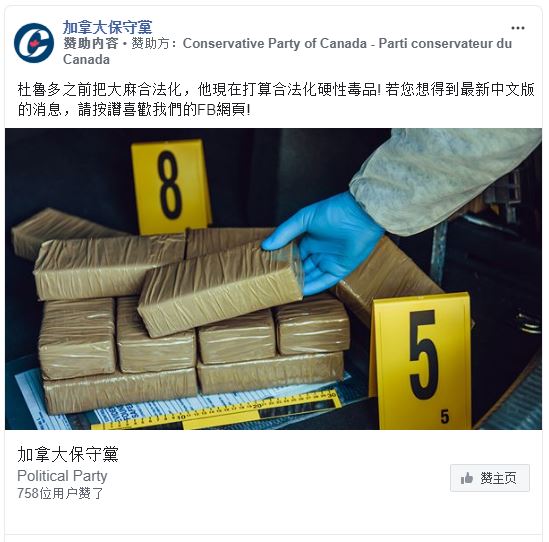Conservative Leader Andrew Scheer is defending his party’s decision to run Facebook advertisements claiming the Liberals plan to legalize hard drugs.

But speaking at an event in Burnaby, B.C., Saturday, he would not say why those ads have only been published in Chinese languages.

“This is something that is very important to Canadians to know about,” he said. “We are telling them that these are the types of things Liberals speculate about before the election, and then implement after the election.”
The first ad to make the claim began appearing on Oct. 6 before it was removed for violating Facebook’s advertising policies. The ad features an image of a hand using a razor blade to cut lines of a white, powdered substance on a mirrored surface.
A second ad then appeared on Oct. 8 and appears to still be running on the social media platform. It includes a picture of what appears to be large packages of drugs along with police evidence markers.
“Before Trudeau legalized marijuana, he now intends to legalize hard drugs!” both ads say in simplified Chinese. “If you want to get the latest Chinese version of the news, please like our FB page!”

The ads are explicitly targeting voters in B.C. and Ontario, according to Facebook’s advertising database, with B.C. receiving nearly 60 per cent of the ad views.
Less than $1,000 has been spent on the two ads, but together they’ve been displayed or seen up to 15,000 times.

Get breaking National news
In a statement, the Liberals said legalizing hard drugs is “clearly” not in the party’s plans, and accused the Conservatives of spreading “disinformation.”

“This is yet another example of Conservatives copying the American right-wing playbook, spreading false information to scare and mislead voters,” a party spokesperson said.
In addition to the ads, two videos were published to the party’s Chinese Facebook page — one in English and one in Cantonese — under the title “Trudeau intends to legalize hard drugs.”
The otherwise identical videos highlight a moment in the French language debate on Oct. 2 where Trudeau was asked if he would legalize other drugs after legalizing marijuana. Trudeau answered, “Not at the moment.”
“Doesn’t such statement admit that Trudeau’s Liberal Party is planning to legalize hard drugs?” the video asks.
At the time, Scheer accused Trudeau of having a “secret agenda,” which Trudeau did not respond to other than accusing Scheer of using “politics of fear.”
In Burnaby, Scheer said Trudeau needs to clarify his position, again pointing to his debate answer.

“He has never clarified exactly what that meant in English,” Scheer said.
“The fact that he’s been unable to come clean on it and speak clearly on it, the fact that his members of caucus support it, and that at their policy convention this was proposed and supported — I believe Canadians have a right to know about it.”
In a September interview with Global National’s Dawna Friesen, Trudeau said he was not looking at decriminalization or legalization “at all right now.” When asked if he would be open to the idea, he said he was looking at other methods to curb the overdose crisis.

“There are other things that we are doing that (are) having a big impact and we’re going to make decisions based on science,” Trudeau said, pointing to the Liberal government’s actions on safe consumption sites and other harm reduction methods that have found their way into the party’s official platform.
At the party’s national convention in 2018, Liberal members voted in favour of a resolution to “re-classify low-level drug possession and consumption as administrative violations” rather than criminal ones.
Trudeau said the idea is “not part of our plans” after the vote.
Toronto Liberal MP Nathaniel Erskine-Smith has long called on the government to decriminalize drug possession, pointing to the success of drug decriminalization in Portugal. Just before the House of Commons adjourned earlier this year, Erskine-Smith tabled a bill that proposed the decriminalization of possession of small quantities of illicit drugs.
A number of health authorities have also urged governments to pursue drug decriminalization as a response to the opioid crisis. Experts have suggested such a move could reduce the stigma that drives many addicts to use drugs alone, where the majority of deaths still occur.
NDP Leader Jagmeet Singh and Green Party Leader Elizabeth May have both supported decriminalizing possession of hard drugs as part of their party platforms, but have stopped short at fully legalizing substances like cocaine and heroin.

NDP MP Jenny Kwan, who’s running for re-election in Vancouver East and hails from Hong Kong, said the ads are part of a longstanding pattern of targeting Chinese Canadians with disinformation.
“It’s absolutely patronizing,” she told Global News. “I think it’s also assuming the Chinese Canadian community are simple people, that people can’t sort through the information, and they assume they’ll accept what they’re told.
“I mean, do they think they can fool people with that lie?” asked Kwan, whose riding covers Vancouver’s Downtown Eastside where the overdose crisis remains an urgent issue.
Global News has requested comment from the Green Party.

The Conservative platform released Friday focuses on addiction recovery and education. Scheer has also called for a more law-and-order approach to the addiction crisis while criticizing the Liberals’ plans for safe consumption sites.
Despite no “hard drug” ads appearing on the party’s English-language Facebook or other social media pages, the Conservatives have begun to advertise the claim in English.
A statement on the party’s website titled “Trudeau’s not-so-hidden agenda: Legalizing hard drugs” says Trudeau has “left the door wide open” on revisiting the idea.
—With files from Rachel Browne
- Canadians involved in tourist bus crash in Dominican Republic, embassy says
- Canadians stuck in Middle East say cities ‘very tense’ as Iran conflict escalates
- Alberta mulls ditching time switch — again — as B.C. moves to permanent daylight
- In London, Poilievre pitches new UK, Australia, New Zealand partnership
















Comments
Want to discuss? Please read our Commenting Policy first.